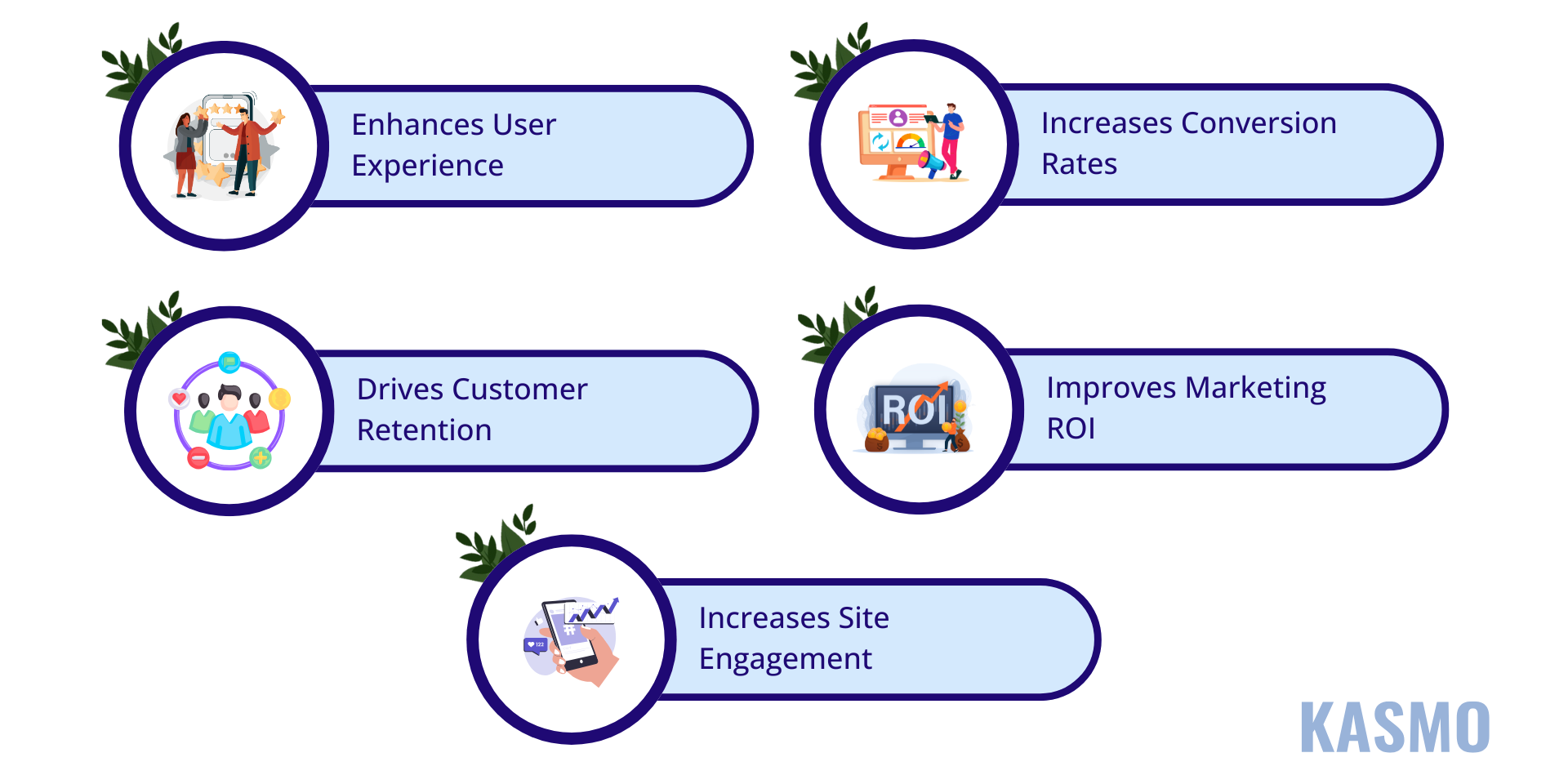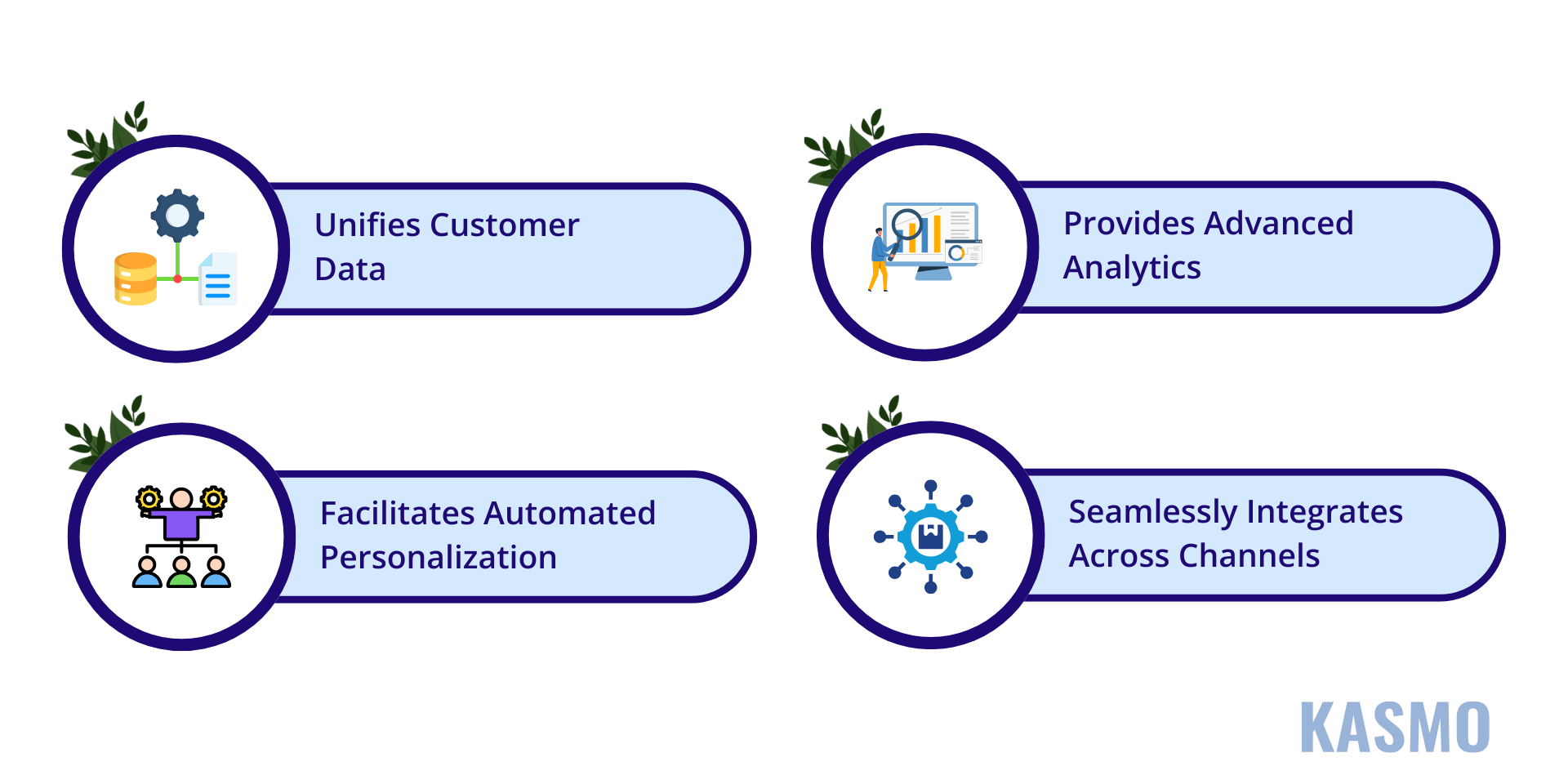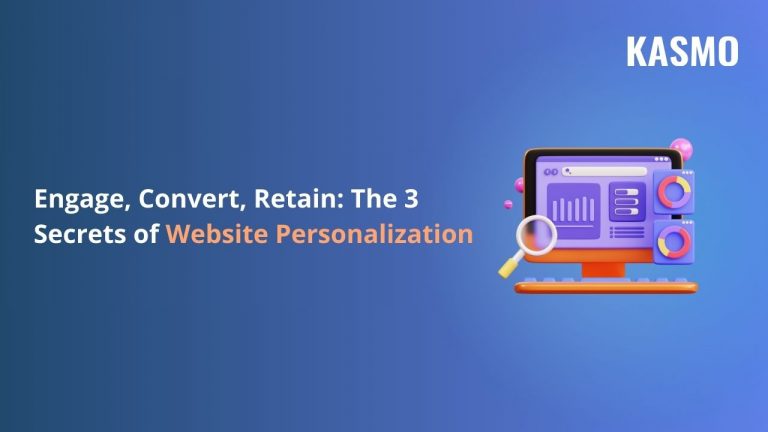What is Website Personalization?
Website personalization refers to the process of delivering a tailored experience to each customer when they visit your website. Unlike static, generic websites that display the same content for everyone, personalized websites adjust various elements — from product recommendations and content to pop-ups — based on the visitor’s behavior, preferences, geographic location, and even their previous interactions with the brand.
For example: According to a customer’s behavior and interactions on their social media channels, a company selling athleisure shoes can provide the customer with only the specific requirements that they are looking for.
Website personalization comprises three different areas:
- Content Personalization: Displaying specific content that resonates with individual visitor interests.
- Product Recommendations: Suggest products that align with the visitor’s browsing or purchase history.
- Targeted Calls-to-Action (CTAs): Offering personalized incentives, such as discounts or promotions, that encourage visitors to take the next step in the buying journey.
By leveraging data, businesses can create highly relevant and engaging experiences that drive visitors toward conversion, improving customer satisfaction and loyalty.
Benefits of Website Personalization
Additionally, website personalization offers an array of benefits that go beyond just improving the customer experience. With B2B website personalization, businesses can expect several advantages that directly impact their revenue and lead generation. Let’s look at how website personalization can help your business:

Enhances User Experience
One of the main reasons why website personalization is so important is – it significantly enhances the user experience. When a website looks tailored to a visitor’s needs, it not only makes navigation smoother but also increases the likelihood of them staying longer on the site. To understand how you can create the best website personalization strategies, follow these steps:
- Create Relevant Content: By creating relevant content, users don’t need to spend any unnecessary time finding what they are looking for – you can make it easier by providing them with what they want.
- Strategize Convenient Navigation: Creating personalized content is not enough – you need to ensure that your website is easy to navigate. Leveraging platforms like Salesforce can help you personalize your website according to the most searched product or service by the customer. By putting the most relevant item or service at the beginning of your website and then more similar recommendations, you make it easy for the customer to make a purchase.
- Fewer Interruptions: Avoid any irrelevant pop-ups and offers that are not relevant to the customers. Ensure that customers are getting only the pop-ups of offers and discounts for the product or service they are actively looking for.
This level of customization creates a more enjoyable and less frustrating experience for your customers, resulting in repeated visits to your website.
Increases Conversion Rates
Website personalization can significantly increase conversion rates. By understanding customer preferences, behavior, and intent, businesses can strategically present tailored content and offers to maximize the chances of conversion. For example, if a customer browses a product category on your site but doesn’t complete a purchase, a personalized follow-up offer — such as a discount or reminder — could motivate them to finalize the transaction.
The power of personalization lies in its ability to speak directly to individual needs. When a user feels like a website is “designed for them,” they are more likely to trust the brand and take the desired action, whether it’s making a purchase, signing up for a newsletter, or filling out a contact form.
Drives Customer Retention
Website personalization is not just about attracting new customers; it is also an incredibly effective tool for retaining existing ones. By continuously offering tailored experiences and rewards based on customer data, businesses can foster a deeper sense of loyalty. For example:
- Display Loyalty Programs: Reward customers for repeat visits or purchases with personalized offers or points based on their previous interactions with the brand.
- Personalized Follow-ups: After a customer makes a purchase, sending a personalized thank-you email or a product recommendation on the website the next time they visit can keep customers engaged.
This level of personalization shows the customers that the brand does not treat them like numbers, but as individuals – leading to higher satisfaction and repeat business.
Improves Marketing ROI
By providing a more relevant and engaging experience to website visitors, personalization directly boosts the effectiveness of marketing efforts. When a business can show personalized offers, promotions, or product suggestions that align with the individual’s needs, they are more likely to respond positively. This results in more efficient use of marketing spend and better ROI on advertising campaigns.
Increases Site Engagement
A more engaging website attracts customers to engage more with your brand. Creating personalized websites also provides businesses with more opportunities to convert new visitors. Whether through tailored blogs, videos, or product recommendations, you can create a deeper connection with visitors and encourage them to explore your website. This increased engagement leads to a higher conversion rate.
Why Leverage Salesforce for Website Personalization?
Salesforce is a leading CRM platform that provides robust tools and resources to businesses for creating the best personalized experiences at scale. Here are a few reasons why you need to choose Salesforce for website personalization:

Unifies Customer Data
Salesforce provides a 360-degree view of your customer by consolidating data from multiple touchpoints — including website interactions, email campaigns, customer service, and sales. This unified data allows businesses to gain a deep understanding of customer behavior and preferences. By using this data, businesses can personalize content and offers across various digital channels as well as on their websites, ensuring a seamless customer experience.
Provides Advanced Analytics
By leveraging Salesforce Agentforce, businesses can easily analyze customer data and track the effectiveness of marketing campaigns. Businesses can tailor Agentforce’s AI agents to track metrics such as conversion rates, customer retention rates, and engagement rates across different communication channels. By using AI agents, you can continuously refine your personalization strategies. This will help you stay informed on how you can deliver the most effective content to each visitor.
Facilitates Automated Personalization
Agentforce’s AI agents help businesses set up personalized experiences without the need for constant manual intervention. For example, automated emails can be sent based on user behavior, such as cart abandonment or product interest, driving more conversions. Personalizing your websites, like banners and product recommendations, can also be dynamically displayed based on user data, ensuring the right message is delivered at the right time.
Seamlessly Integrates Across Channels
Salesforce CRM and Agentforce can be integrated across multiple channels, like WhatsApp, social media platforms, websites, etc. Whether it’s through email marketing or customer support, Salesforce ensures that your personalization efforts are consistent across all touchpoints. This holistic approach helps you create a consistent experience for your customers, making them feel valued and understood.
How Does Website Personalization Help B2B Firms?
B2B companies frequently employ the Account-Based Marketing (ABM) approach, where marketing and sales efforts are concentrated on high-value accounts. By identifying high-value clients visiting the website, businesses can automate website personalization, deliver tailored content that resonates with the decision-makers of the target account, and increase the probability of the lead converting into a potential customer.
With website personalization, you can address the unique challenges of your customers, increasing the likelihood of engagement and conversion. For example, strategically planning pop-ups of case studies, whitepapers, and product demos can subtly nudge the customer to learn more about the product or service provided by your business.
Enhancing Lead Nurturing and Sales Enablement
B2B sales cycles are often lengthy, involving consistent and targeted lead nurturing. With automated website personalization, businesses can track visitor behavior and engagement. By tracking the customer’s journey, you can get valuable insights into their interests and which stage they are in their purchasing journey.
This data can be used by your marketing teams to deliver personalized content that will guide the lead through all the stages of the sales funnel. Furthermore, this same data can help your sales team to better understand the client and engage with them throughout their customer journey.
Dynamic content creation, such as personalized calls-to-action and product recommendations, can be implemented to encourage further engagement and accelerate the sales process.
Optimizing the Customer Journey and User Experience
B2B buyers expect a seamless digital experience when they visit your brand’s website. Website personalization allows businesses to optimize the customer journey by delivering relevant content and information based on visitor behavior and preferences.
This includes personalized website navigation, tailored product recommendations, and dynamic content creation, adapted to individual customers’ needs. For example, a returning visitor might be presented with content related to their previous interactions, while a new visitor might be guided through an introductory product tour.
Providing Data-Driven Insights and Continuous Improvement
Website personalization generates valuable data that can be used to gain insights into customer behavior and preferences. This data can be analyzed to identify trends, optimize marketing campaigns, and improve the user experience.
A/B testing can be used to evaluate the effectiveness of different marketing and advertising strategies, helping you identify the most effective approaches. By continuously analyzing data and optimizing personalization strategies, businesses can ensure that their website remains relevant and effective.
Conclusion
Customers want services to be faster and personalized. However, they are not eager to share their data. 64% of customers believe that most companies are reckless with their customer data. Companies need to be transparent and maintain ethical standards while using customer data and AI to make tailored products or services. With website personalization, businesses can enhance user engagement, drive higher conversions and improve customer retention.
By leveraging powerful tools like Salesforce Agentforce, businesses can automate, scale, and optimize their personalization efforts, ensuring that they are delivering relevant and meaningful experiences across every customer touchpoint. Personalization helps build lasting relationships, boost sales, and enhance revenue and ROI.


